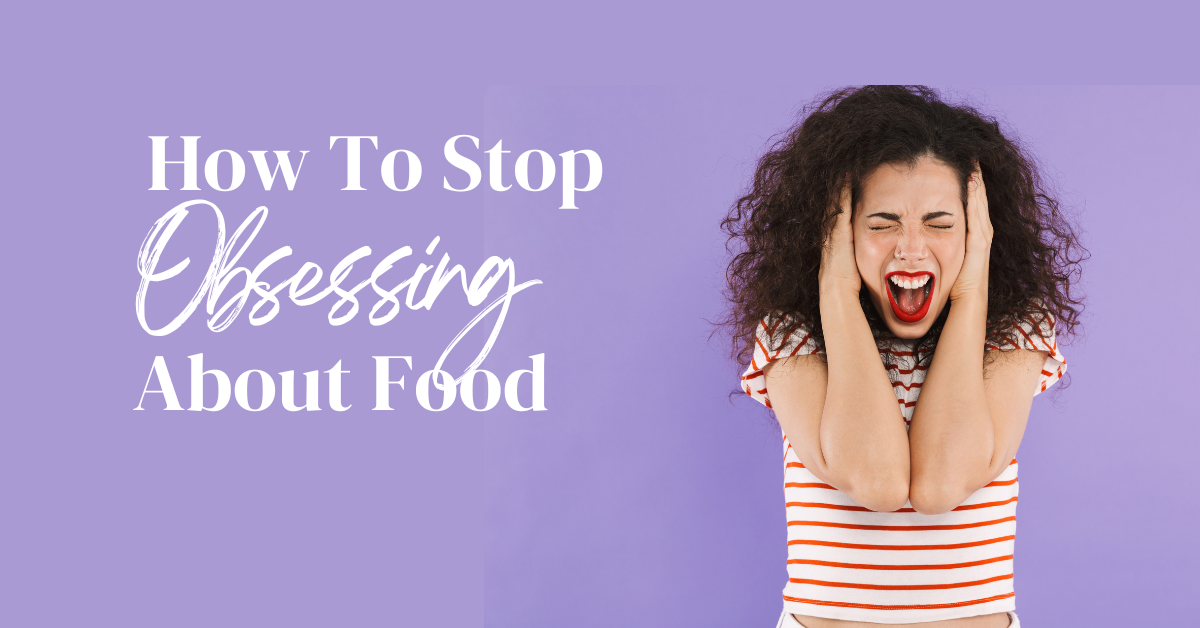“Just don’t think about it.” “Just don’t eat it.” Oh if it were that easy to stop obsessing about food, am I right?! Unlike other substances, we cannot NOT eat food as a means to reach our goals and eliminate all the head games and triggers surrounding food. Thoughts about food will always be part of our life, because we’re human.
Many people struggle silently thinking about food for what feels like 24/7, interrupting what is most important to them such as family, happiness, professional development, and or other personal goals. Here are 5 tips to help you reduce the emotional weight around food and stop feeling obsessed.
#1 Stop Weighing Yourself
Take a looooong vacation from the scale. Oftentimes, our obsessions with food and overwhelming pressure to “be good” in our everyday eating is linked to an intense focus on weight loss and weighing yourself often.
Seeing what the scales says you weigh (or don’t weigh) can trigger your mind to set strict rules for the day OR opposite, cause you to feel like throwing in the towel and having a “F*ck it” kind of day of eating, both of which will never lead you to a sustainable way of eating.
Weighing yourself daily or too often in general may have started off with good intentions but it can quietly intensify behind the scenes and before you know it, your world is small and completely food and weight focused. An attempt to lose weight can cause eating disorders, a feeling of guilt and even food addiction.
Removing the scale will help you change the environment to which you operate in. If you were trying to get sober, would you try to learn how to change your life and stop thinking about alcohol while sitting in a bar? Absolutely not, that environment would be a total distraction and intense trigger no matter who you are.
The scale can create that same unhealthy environment in the minds of many which is why it is important to get yourself OUT of that environment if the scale intensifies your food obsessions.
ONLY when you’re in the mindset that you can be objective about what the scale says and feel confident that the number on the scale does not define you or all your progress to date would I recommend you revisit weighing yourself no more than once a week.
Focus on how you mentally feel, physically feel, how your clothes fit, or how other secondary symptoms improve such as IBS, sleep, fatigue, and cravings as a means to “measure” your success.
Only when you no longer have the scale in your life will you see how interruptive it truly was for you and will open up new opportunities to find more peace in your every day eating and mindset around food.
EVERY new client of mine is instructed to NOT weigh themselves until further notice for these very reasons. It’s not always easy to just stop weighing yourself, so if you have to give your scale to a neighbor or to your spouse and tell him or her to just hide it somewhere for you, do it. It is time to burn your boats with the scale.

#2 Focus On Feeling Good vs Being Good With Food
When you can remove the scale from your life, it will make it much easier to focus on feeling good vs being good with food. This is a total mind shift which sounds easy but it is not easy to do necessarily.
Many of my clients are Type A personalities. They like to win, they are successful in many areas of their lives and know how to work hard. When they try to apply the same “all out” mentality with their food it increases food obsessions, creates a bland, mechanical, annoying experience with food, and sets a high bar of perfectionism with eating.
Mindful eating is about feeling good and not about being good so lets let go of perfectionism. Eating is not static.
You are a human being and not a robot. You have emotions. You can’t just stop eating.
In fact, your mind and body REQUIRE you to get pleasure from what you’re eating. And when you don’t because you’re trying to “be good” all the time with your eating, your brain will scream, “hungry!!!” and your thoughts and obsessions about food will be at large.
You are not a bad person if you want and need some foods that intellectually you know are not “healthy” or high quality. Part of “normal eating” will still include on occasion overeating or eating when you are not hungry. IT’S OK!
It’s important you FEEL GOOD with some balance in your life and with your eating. You can still win without being perfect, I promise, you just have to get out of your own damn way! Food rules and restrictions lead to eating certain foods–”bad foods”–instead of intuitive eating.
The hard step here is just initially giving yourself permission to LET GO of perfectionism in order to approach your everyday food decisions from a feeling good approach. Once you do, you’ll feel a high level of relief almost immediately from food obsessions.
#3 Check Your Intentional or Unintentional Food Restrictions
Sometimes our food obsessions and compulsions are physiologically driven. When there is fear around eating the wrong things or fear about gaining weight, it is easy to actually not eat enough.
When your body does not get enough food or specific macronutrients while you simultaneously demand your body exert a ton of energy daily, it will become stressed in its need for more food. You need a certain amount of food intake. You would die without it.
Primitive, evolutionary survival instincts kick in in the search for food, and naturally you will find yourself thinking more and more about food and your cravings will increase like you are a devouring wolf as a means to ensure your survival.

So instead of getting mad that you’re in this position of thinking so much about food, perhaps we pause and listen to what these urges may be telling you.
Have you been avoiding carbohydrates? Healthy fats? Has the obsessions increased since you have been trying to be 100% plant based and lowering your protein intake?
You could do a quick inventory without food logging and find your answer, and if your answer is YES to both, begin adding a little of what you feel you have been depriving your body of and continue to assess how that impacts your food obsessions.
If you are not sure, you can log your food for a few days to get a gauge. This is where food logging can be used as a tool without being abused.
If you are under 1200 calories as a female, you’re not eating enough. If you are under 1600 calories for a male, you’re also probably not eating enough. Log for no more than 7 days to get the answers you need.
If you think you may be missing valuable energy or macronutrients overall, begin to nourish your body with a small amount of high quality food of whatever you may be missing (healthy fats, carbs, proteins) over the coming weeks and see how things improve.
#4 Sprinkle More Joy In Your Life
I have found over the years that food oh so often is simply a placeholder for other things, one of the biggest being a source of joy. “It is the only thing I do for myself that I enjoy” is a common statement I hear. If your only source of joy is food then naturally you are going to find yourself thinking and obsessing about food a LOT.
Stop and think, ‘what are other sources of joy that I could add into my life? What are people, places, activities, things that simply light me up for a few minutes?’ Think small such as scented candles, a made bed in the morning, watching birds from your window, feeling the sun and wind on your face, seeing your puppies get excited when you walk through the door after work, etc. THESE are the little things that make life so fulfilling. They are all around you, I promise.
It may not come to you easily when you try to stop and think about other sources of joy in your life, but be patient. Literally make what I call a Pleasure Inventory list as you identify more and more things that bring you a little hint of joy. Engage in anything on your lists as often as possible and you’ll find that your food obsessions will naturally decrease significantly.

#5 Ask For Help
Regardless of who you are, how successful you are, or how much you know about food, sometimes you just need a little help putting all the pieces together regarding the “how-to” stop obsessing about food.
We all know eating can be just a huge head game with you at the very center, making it very difficult to see things clearly and objectively. Plus, this is not your expertise, so you just may not have all the solutions you think you need.
Having a high level of support and accountability is a game changer when it comes to lowering food obsessions.
Our members often need permission to follow their gut instincts, a compassionate conversation to help them unpack all the chatter in their head and emotions that are coming up for them in the process of bettering their relationship with food. I have worked with other coaches, fitness experts, psychologists, amongst many other professionals who in their minds “know what they should be doing”.
Getting help comes from a place of strength, NOT weakness. Here is another great resource for you to check out, my free training, The 4 Shifts to End Your Binge Eating, Emotional Eating, and Lifelong Dieting. If you’re looking for coaching, we offer multiple levels of coaching to help meet you where you are at, you can learn more about these options here. Getting unstuck can happen a LOT faster when you have the right people in your corner.
Enjoy this blog? Please share it with those who could also benefit from extra support with food and weight struggles…


